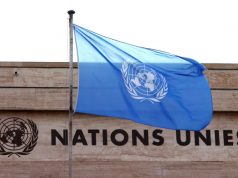GENEVA — A record 29 states, including China, Iran and Saudi Arabia, have retaliated in the past year against citizens who cooperate with the United Nations, the U.N. human rights office said on Wednesday.
People communicating with the rights body had been abducted, detained, held incommunicado, or had disappeared, U.N. Assistant Secretary-General for Human Rights Andrew Gilmour said.
Nine of the states named in the report — Burundi, Egypt, Rwanda, Cuba, Venezuela, China, India, Saudi Arabia and the United Arab Emirates — are current members of the 47-country U.N. Human Rights Council.
Gilmour told the Council that it was “nothing short of abhorrent” that his office had to keep coming back with examples of states victimizing people for helping the United Nations — Wednesday’s was its eighth annual report on the reprisals.
“There is something grotesque and entirely contrary to the Charter and spirit of the United Nations, and particularly this Council, that people get punished, through intimidation and reprisals, for cooperating with the U.N. on human rights,” he said.
None of the Council members chose to respond to his remarks.
The other 20 countries in the report were Algeria, Bahrain, Eritrea, Honduras, Iran, Israel, Mauritania, Mexico, Morocco, Myanmar, Oman, Pakistan, South Sudan, Sri Lanka, Sudan, Tajikistan, Thailand, Turkey, Turkmenistan, and Uzbekistan.
In previous reports, an average of 15 countries were listed, and never more than 20. China and Saudi Arabia have featured on six of the eight lists published so far.
Gilmour said the true number of cases was much higher but the report omitted many for reasons of confidentiality or security of the victim.
Among the victims named in the report was Bahraini activist Ebtesam Abdulhusain Ali Alsaegh, who testified to the Council but was then detained on her return to Bahrain and was beaten and sexually assaulted a few weeks later, Gilmour said.
Other victims lost their jobs, had their homes or offices raided, or were targeted by travel bans or asset freezes. Many cases involved arbitrary detention and torture, sometimes by sexual assault or rape.
Some countries “justified” their tactics by saying the individuals were terrorists or cooperating with foreign entities aiming to damage the state, Gilmour said.
“I think we should see these individuals as the canary in the coal-mine, bravely singing until they are silenced by this toxic backlash against people, rights and dignity — as a dark warning to us all.”










